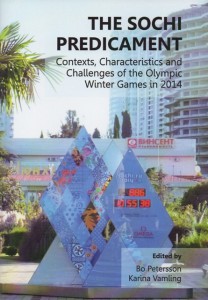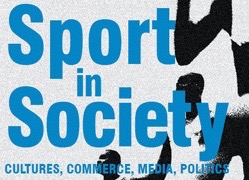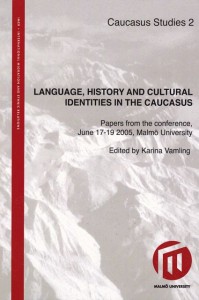The Sochi Predicament:
Contexts, Characteristics and Challenges of the Olympic Winter Games in 2014
Published by Cambridge Scholars Publishing, 2013.
 “For a variety of political, climatic, ecological, security-related and other reasons, the Russian summer resort of Sochi by the Black Sea would seem a most unlikely candidate for the Olympic Winter Games. Despite this, the Games will be held there in February 2014, and the Russian leaders regard the Games as a highly prestigious project underlining Russia’s return to a status of great power in the contemporary world. This book conducts a thorough inventory of the contexts, characteristics and challenges facing the Sochi Games. It deals with the problems from Russian, Georgian, Abkhazian and Circassian perspectives and makes in-depth analyses of profound challenges related to matters such as identity, security, and ethnic relations. The book brings together an international group of eminent scholars representing different disciplinary perspectives, including political science, sports science, ethics, ethnology, and Caucasian studies.”
“For a variety of political, climatic, ecological, security-related and other reasons, the Russian summer resort of Sochi by the Black Sea would seem a most unlikely candidate for the Olympic Winter Games. Despite this, the Games will be held there in February 2014, and the Russian leaders regard the Games as a highly prestigious project underlining Russia’s return to a status of great power in the contemporary world. This book conducts a thorough inventory of the contexts, characteristics and challenges facing the Sochi Games. It deals with the problems from Russian, Georgian, Abkhazian and Circassian perspectives and makes in-depth analyses of profound challenges related to matters such as identity, security, and ethnic relations. The book brings together an international group of eminent scholars representing different disciplinary perspectives, including political science, sports science, ethics, ethnology, and Caucasian studies.”
Karina Vamling is the co-editor together with Bo Petersson. Lars Funch Hansen and Revaz Tchantouria, both lecturers at Caucasus Studies, are the authors of two of the chapters.
Table of Contents
Introduction
The Sochi Winter Olympics: Walking Tightrope?
– Bo Petersson and Karina Vamling
Part I: Olympic Perspectives
1 Snow, Ice, and Vertical Drops: What is Different about the Sochi Olympics?
– Raymond Taras
2 The Sochi Winter Games: Marketing and Sustainable Development—Or Neither Nor?
– Karin Book
3 Environmental Ethics and the Olympics: On the Reconstruction of Nature for Sport
– Kutte Jönsson
Part II: Identity Matters
4 Olympism and Empire: The Olympic Myth in the Contestation of the Caucasus
– Emil Persson
5 Sochi as a Site of Circassian Long-Distance Memorialisation
– Lars Funch Hansen
6 The Sympols of Sochi 2014: Searching for the Visual Signs of New Russian Political Identity
– Sergei Akopov and Vitalii Volkov
Part III: Internal Order and Security
7 Russia’s Olympic Discourses: Effects of Unification and Diversification
– Andrei Makarychev
8 Securitization in the North Caucasus on the Eve of the Sochi Games
– Uliana Hellberg
9 The Terrorist Threat Against Sochi 2014
– Jakob Hedenskog
Part IV: Caucasian Knots
10 Security of the Winter Olympics in Sochi from a Georgian Perspective
– Alexandre Kukhianidze
11 Abkhazia and the Preparations for the Sochi Games
– Revaz Tchantouria
12 Disputed Frontiers: Abkhazia in Russia’s Sochi 2014 Project
– Helena Rytövuouri-Apunen






 Lars Funch Hansen, senior lecturer at Caucasus Studies, has recently published the article iCircassia digital capitalism and new transnational identities in the first volume of the new Journal of Caucasian Studies.
Lars Funch Hansen, senior lecturer at Caucasus Studies, has recently published the article iCircassia digital capitalism and new transnational identities in the first volume of the new Journal of Caucasian Studies.
